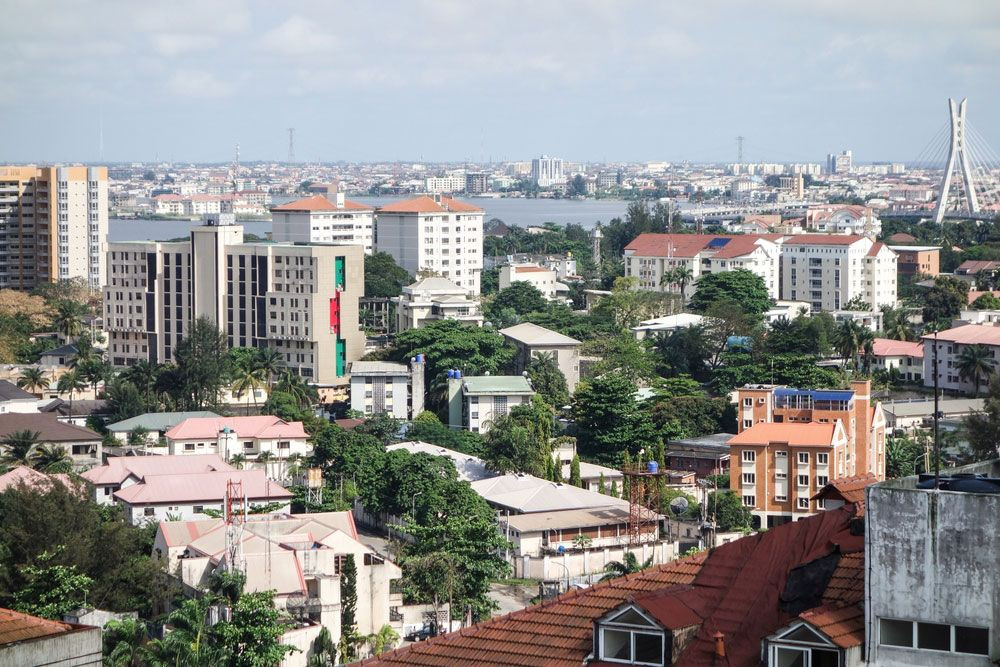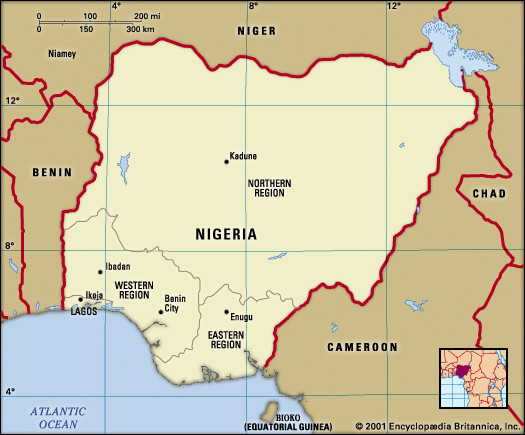Lagos is situated in Nigeria, West Africa, and stands as the country’s most populous city and a major urban center in sub-Saharan Africa. Located on the coast, Lagos is positioned on the Bight of Benin, part of the Gulf of Guinea in the Atlantic Ocean. While no longer Nigeria’s official capital, having been replaced by Abuja in 1991, Lagos remains a vital hub for commerce, culture, and government activities.
Geographical Location of Lagos
Lagos’s unique geography is defined by its lagoon and island system. The city center is primarily located on Lagos Island, within the Lagos Lagoon. This lagoon opens into the Gulf of Guinea via Lagos Harbour. Historically, Lagos developed across four main islands: Lagos Island, Iddo, Ikoyi, and Victoria Island. Through extensive land reclamation projects, some of these are no longer distinct islands, with Ikoyi and Victoria Island now connected to Lagos Island and the mainland.
These islands and mainland areas are connected by a series of bridges, essential for navigating the city’s complex waterways. The terrain of Lagos is notably low-lying, with the highest point on Lagos Island only about 22 feet (7 meters) above sea level. This low elevation makes it susceptible to the impacts of rising sea levels.
A Brief History of Lagos
The history of Lagos dates back to the late 15th century when Yoruba fishermen and hunters first settled Lagos Island, calling it Oko. By the late 16th century, the Kingdom of Benin exerted its influence, renaming the area Eko and holding sway until the mid-19th century.
The Portuguese were the first Europeans to arrive, landing in 1472. Initially, trade was slow, but it escalated significantly when the Portuguese were granted monopolies to trade slaves in Spanish colonies. Local rulers maintained positive relationships with the Portuguese, who named the island Onim, later Lagos, and established a thriving slave trade.
British efforts to suppress the slave trade led to a naval attack in 1851, resulting in the removal of the local ruler. Despite this, the slave trade persisted until Britain formally annexed Lagos in 1861. Lagos became a British crown colony and was integrated into the West African Settlements. Later, it was part of the Gold Coast Colony before regaining separate status in 1886. In 1906, it was merged with the Protectorate of Southern Nigeria.
When Northern and Southern Nigeria unified in 1914, Lagos was designated as the capital. Even after Nigeria gained independence in 1960, Lagos remained the capital. However, due to overcrowding and infrastructural challenges, the federal capital was moved to Abuja in 1991. Despite this change, Lagos continues to be a crucial center for many government functions and remains the capital of Lagos State, created in 1967.
Lagos Today: Economy and Culture
Lagos is the economic powerhouse of Nigeria, driven by its port, Apapa Quay, which is the primary point for Nigeria’s exports. Industries in Lagos are diverse, including electronics, automotive assembly, food processing, metalworks, paints, soap, textiles, cosmetics, and pharmaceuticals. Fishing also remains an important local industry.
Culturally, Lagos is a vibrant metropolitan area. It boasts numerous educational institutions, including the University of Lagos, alongside cultural landmarks like the National Library and the National Museum. The city is a melting pot of Nigerian culture, reflecting its diverse population and historical significance. While facing challenges like traffic and pollution, Lagos continues to be a dynamic and essential city in Africa.
In conclusion, Lagos is located in southwestern Nigeria, on the coast of West Africa. It is a city of immense historical, economic, and cultural importance to Nigeria and the African continent, firmly established as a major global city despite no longer being the nation’s political capital.
[


 Nigeria in 1960
Nigeria in 1960